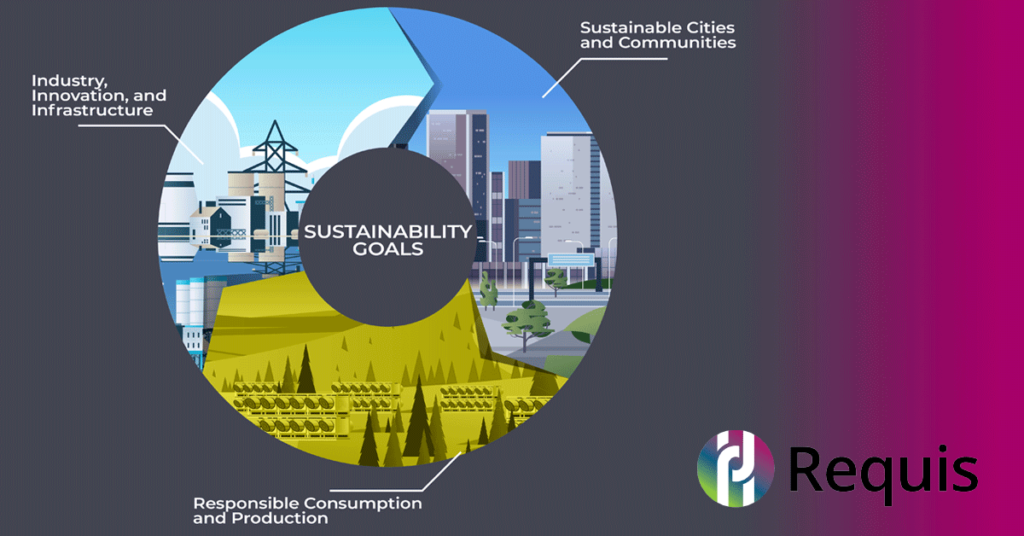August 2, 2023
Three Global Sustainability Goals and How to Achieve Them with Requis
Businesses across the globe are setting more sustainable and environmentally focused initiatives. However, even though 90% of business leaders think sustainability is necessary, only 60% of companies have a sustainability strategy in place to move the needle.
The United Nations released the 2030 Agenda for Sustainable Development and 17 associated Sustainable Development Goals (SDGs) to drive action toward a more sustainable future.
Procurement professionals within the Energy, Construction, and Manufacturing industries are well-poised to leverage more vital technology to access more significant insights into current projects and inventory, track carbon emissions, and improve consumption habits to help contribute toward a better future for all.
These three goals help your enterprise focus on sustainability while creating a more circular economy and driving actionable change worldwide.

Industry, Innovation, and Infrastructure
Capital procurement projects—specifically how they are planned and how their materials are sourced—play a pivotal role in developing infrastructure worldwide. The United Nations aims to bring attention to this by setting a goal to “build resilient infrastructure, promote inclusive and sustainable industrialization and foster innovation.”
In any infrastructure development, procurement professionals must carefully source materials that meet project requirements and related environmental, social, and governance (ESG) goals. According to Deloitte’s 2022 Global CXO Sustainability Report, many organizations have prioritized sustainability, with 67% using more sustainable materials and 57% using energy-efficient or climate-friendly machinery, technologies, and equipment.
However, finding suppliers and business partners to meet specific sustainability criteria is not always easy. Additionally, certain industries, such as manufacturing, fall further behind sustainability goals because they lack the technology needed to remain resilient and adapt to challenges and changing goals.
How Requis Helps
As the UN cites, higher technology industries are far more resilient in crisis than their lower-tech counterparts. Requis delivers an efficient, easy-to-use procurement platform that allows users to speed up supplier qualification, adapt to changing markets, and expand access to buyers and sellers for more sustainable material management.
By leveraging Requis’ API, procurement professionals get access to the Dun & Bradstreet- and user-vetted data that flows between various ERP, design, financial, asset management, and procurement programs, to make better-informed decisions that can contribute to sustainability goals across multiple projects.
Sustainable Cities and Communities
Focusing on improving the conditions in which global citizens live, the UN also set a global sustainability goal to “make cities and human settlements inclusive, safe, resilient, and sustainable.”
When developing plans for new capital projects, procurement teams have a significant opportunity to source materials that contribute to improved safety and focus on sustainable land-use planning + management and construction industry activities.
To do so, procurement teams must have a wide scope of available materials that meet sustainability requirements and an accurate view of what additional materials will be needed to complete the project on time and within budget.
Unfortunately, too many procurement teams lack the insight needed to track existing inventory properly and efficiently—resulting in additional (non-sustainable) production of additional materials and wasted surplus.
How Requis Helps
Requis delivers accurate intelligence into equipment and material availability, sales, and shipping. Through Requis Visibility and Operator-to-Operator platforms, users can leverage Requis to achieve full transparency into the supply chain and procurement data, enabling them to make more informed, strategic decisions with sustainability in mind.
Requis also enables users to connect ESG scores, dashboards, and analytical solutions to monitor an organization’s carbon footprint. Not only does this enable businesses to meet better corporate KPIs related to carbon management, but it also keeps carbon tracking—and its impact on sustainability—as a core function within the sourcing and procurement process.
Responsible Material Usage and Production
As reported in The Circular Economy’s 2023 Circularity Report, the global circularity gap has widened to 7.2%, with unsustainable consumption and production patterns at the root cause of climate change, biodiversity loss, and pollution worldwide. The planet cannot handle the speed and degree to which humans are producing and using materials.
The United Nations has set a goal to “ensure sustainable consumption and production patterns” to combat the reported 65% global reliance on natural resources.
Procurement organizations hold great power in making impactful change regarding this issue—with public spending accounting for 12% of the GDP of Organisation for Economic Co-operation and Development (OECD) nations and 30% of developing nations. By implementing sustainable procurement processes, organizations around the globe can both financially benefit the business and simultaneously reduce negative impacts on the environment.
However, to do so, procurement teams need a more efficient way to buy and manage materials used within capital projects.
How Requis Helps
Requis is a platform entirely focused on capital procurement projects and energy industries. Our solution offers several easy-to-use capabilities that make it easier for organizations to prioritize sustainability and contribute to a circular economy.
The platform uses real-time data to allow businesses of all sizes in 60 countries to buy and transfer used goods, saving costs and reducing the amount of waste and pollution produced within capital projects. As users exchange surplus goods between their businesses, the need to produce additional goods lessens, as does the strain these patterns place on our planet.
Achieving Sustainability Goals with Requis
It’s never too late to prioritize sustainability and participate in a more circular economy. By leveraging Requis, Oil, Gas, and Construction, procurement teams can access a secure environment for the transfer of assets while leveraging better technology for improved business objectives.
If you’re ready to reduce waste, make sustainability a core focus for your organization, and contribute to a better tomorrow, contact Requis today.
